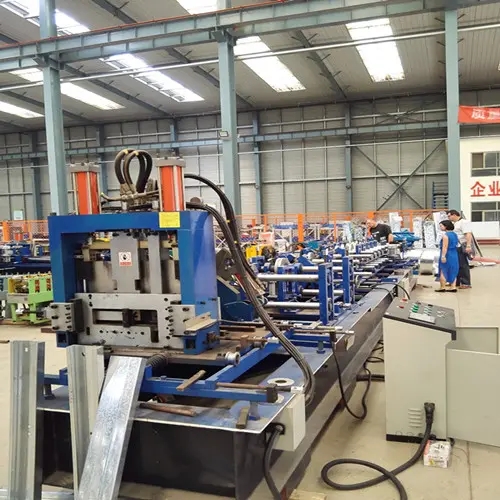
The Importance of Metal Sheet Roll Forming Machines
Metal sheet roll forming machines play a crucial role in modern manufacturing processes, particularly in the production of metal profiles and components used across various industries. These machines convert flat sheets of metal into specific shapes through continuous rolling and bending. The versatility, efficiency, and precision of roll forming technology make it an essential tool in creating items ranging from roof panels to automotive parts.
How Roll Forming Works
The roll forming process begins with a flat sheet of metal, which is fed through a series of rollers that progressively shape the material into the desired profile. As the metal sheet passes through the machine, it is gradually formed by a series of rollers, each designed to modify the sheet’s shape incrementally. The process allows for complex shapes and consistent production which is a significant advantage over traditional methods like stamping.
The roll forming machines can operate with various metals, including steel, aluminum, and copper, providing manufacturers the flexibility to work with different materials according to their project requirements. Additionally, the combination of high-speed production and automated systems enables manufacturers to maintain a steady output, which is vital in today’s fast-paced industrial environment.
Advantages of Roll Forming
One of the significant advantages of using metal sheet roll forming machines is their efficiency
. This method not only speeds up the production process but also minimizes material waste. Unlike other metal shaping techniques, roll forming generally produces very little scrap material, making it a cost-effective option for manufacturers.
Moreover, the durability and strength of the components produced through roll forming are unmatched. The continuous nature of the process leads to a uniformly thick product, which assures high quality and reliability. This reliability is particularly beneficial in applications such as structural components in construction and parts in the automotive industry, where safety is paramount.
The machines are also highly customizable. Manufacturers can design their roll forming lines to produce specific profiles tailored to their needs. This customization allows for a wider range of products to be manufactured, providing businesses with a competitive edge in the marketplace.
Industry Applications
The application of roll forming technology spans various industries. In construction, it is used to create roofing materials, wall panels, and support structures. In the automotive sector, roll-formed parts are integral for vehicle frames and body components, where both lightweight construction and strength are critical.
Additionally, the evolution of roll forming technology has led to innovations such as integration with computer numerical control (CNC) systems, enhancing precision and allowing for more intricate designs. This advancement has opened doors for smaller manufacturers to produce custom parts at scale without compromising quality.
Conclusion
In conclusion, metal sheet roll forming machines are instrumental in producing high-quality, efficient, and cost-effective metal components across various industries. Their ability to create complex shapes and minimize waste makes them a cornerstone of modern manufacturing. As the industry continues to evolve, the role of roll forming machines will undoubtedly expand, leading to further innovations and improvements in industrial production methods. Investing in these machines not only boosts productivity but also positions manufacturers to meet the growing demands of the market.